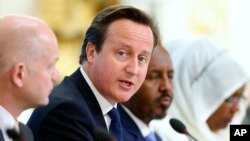LONDON —
Representatives of more than 50 countries and international organizations pledged continuing support for Somalia's new government during a conference in London on Tuesday.
The conference final communique calls this “a pivotal moment” for Somalia, and pledged continued support for political reform, building security and the justice system, and improving financial management and transparency. It also calls for continued efforts to improve the Somali economy, take care of displaced people and protect human rights.
The document also indicates continuing concern about using the new Somali government's institutions to funnel aid, and says international organizations still have a key role to play.
The conference co-host, British Prime Minister David Cameron, said the daylong event was useful in keeping international support flowing to Somalia as the government, created late last year, establishes its authority.
"Real progress has been made about backing the president's plans for putting the country of Somalia back together again. That is, effectively, what is being done here -- very clear plans, very clear support from the international community, building on the progress of the last 12 months," Cameron said.
Somali President Hassan Sheikh Mohamud said he was heartened by the international support, and summarized his message to the world leaders.
"The world has a partner it can trust. We are working hard to reform our country, despite the great challenges that are in place," Mohamud said.
Somali and African forces have pushed back al-Shabab rebels over the past two years, in a move to improve security, which the communique calls “the essential prerequisite” for progress in all areas.
But a British government statement calls that progress “fragile,” and Prime Minister Cameron said that aside from a desire to help Somalis, the West has another important reason to help ensure Somalia does not again descend into chaos.
"Radicalism is poisoning young Somali minds and breeding terrorism and extremism. This is a threat to our security, and if we ignore it, we would be making the same mistakes in Somalia that we made in Afghanistan in the 1990s," Cameron said.
The conference praised local efforts to improve the economy in Somalia, partly in an effort to provide work for young men and reduce pirate attacks on ships off the coast. Piracy is down substantially over the past year.
International efforts to help Somalia will continue in a series of meetings in Brussels, Addis Ababa and Tokyo in the coming months. And in a move President Mohamud sees as significant, the United Nations is to deploy a team to coordinate all the organization's activities in Somalia.
The conference final communique calls this “a pivotal moment” for Somalia, and pledged continued support for political reform, building security and the justice system, and improving financial management and transparency. It also calls for continued efforts to improve the Somali economy, take care of displaced people and protect human rights.
The document also indicates continuing concern about using the new Somali government's institutions to funnel aid, and says international organizations still have a key role to play.
The conference co-host, British Prime Minister David Cameron, said the daylong event was useful in keeping international support flowing to Somalia as the government, created late last year, establishes its authority.
"Real progress has been made about backing the president's plans for putting the country of Somalia back together again. That is, effectively, what is being done here -- very clear plans, very clear support from the international community, building on the progress of the last 12 months," Cameron said.
Somali President Hassan Sheikh Mohamud said he was heartened by the international support, and summarized his message to the world leaders.
"The world has a partner it can trust. We are working hard to reform our country, despite the great challenges that are in place," Mohamud said.
Somali and African forces have pushed back al-Shabab rebels over the past two years, in a move to improve security, which the communique calls “the essential prerequisite” for progress in all areas.
But a British government statement calls that progress “fragile,” and Prime Minister Cameron said that aside from a desire to help Somalis, the West has another important reason to help ensure Somalia does not again descend into chaos.
"Radicalism is poisoning young Somali minds and breeding terrorism and extremism. This is a threat to our security, and if we ignore it, we would be making the same mistakes in Somalia that we made in Afghanistan in the 1990s," Cameron said.
The conference praised local efforts to improve the economy in Somalia, partly in an effort to provide work for young men and reduce pirate attacks on ships off the coast. Piracy is down substantially over the past year.
International efforts to help Somalia will continue in a series of meetings in Brussels, Addis Ababa and Tokyo in the coming months. And in a move President Mohamud sees as significant, the United Nations is to deploy a team to coordinate all the organization's activities in Somalia.




